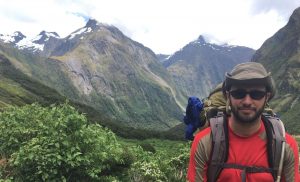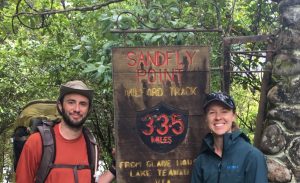Q+A with BCM’s New Executive Director David Taus

Q: What about Big City Mountaineers (BCM) inspired you to apply for this position?
David: My career has always placed me at the intersection of public education, nonprofits, youth development, equity and social justice, and outdoor education. I thus was drawn to Big City Mountaineers’ work as soon as I learned of it, which was many years ago via articles and ads in Backpacker magazine. Without question, the most impactful learning and growth experiences I have ever participated in have been immersive experiences in the natural world —much like the ones that BCM provides. Personally dedicating myself to support such experiences for youth carries great personal appeal and meaning.
This deep alignment with BCM’s mission has drawn me to the organization and the role; BCM speaks to my values as an educator and a person who loves the outdoors. The importance of learning about one’s world and oneself through connection with nature has been a throughline in my career and life.
Q: Tell us more about your past work as an educator and how you think it translates well to your new role at BCM.
David: I have been working directly with those younger than myself since the age of 14 as a tutor, high school classroom teacher, youth program facilitator, summer camp counselor, and outdoor educator/naturalist. In virtually all these roles, I have served students who come from traditionally marginalized communities. Throughout, I looked for ways to provide experiences in the natural world for my students, even when I was working in traditional and more formal academic settings. For example, as a science teacher in Boston Public Schools, I founded my school’s Outdoor Club and was able to take a group of students on an overnight backpacking trip. It was the first time many of them slept outside
As my career progressed, I transitioned into senior and executive roles in education and youth-focused nonprofit organizations serving similar populations of students as BCM does. Having co-founded a nonprofit, and having been instrumental in the turnaround of another, I understand the challenge of growing, supporting, and sustaining organizations like BCM. In so many ways, this role and this organization represent an incredible convergence of all the things I have done thus far in my career.
Q: What are some of the vision pieces you’re thinking about in your new role at the BCM?
David: I know that BCM has engaged in deep internal reflection around Justice, Equity, Diversity, and Inclusion (JEDI) over the past year. I acknowledge and support the steps its staff and Board have already taken in this regard. In addition to better equipping BCM to be advocates for the students and communities it serves, I believe BCM has the opportunity to grow as a leading voice in the outdoor industry for issues related to JEDI, especially when youth are involved. Outdoor recreation is still predominantly a white and privileged space in our society, and it should not be so —- nature is for everyone. BCM is uniquely positioned to help make outdoor recreation more diverse and inclusive, and I intend to amplify our voice in this space.
In education circles right now, the topic of social-emotional learning (SEL) is gaining importance. Educators are struggling with questions of how to promote social-emotional skills and character development in students, especially in formal academic settings that have been affected by COVID. I believe that BCM’s programming is a very productive and powerful potential solution to this: as both a former classroom teacher and trip leader, I remain convinced that a week on a trail can potentially support a person’s social development, values, health, resilience, and sense of self-worth than years of sitting in traditional classrooms. I would like to position BCM’s programming as a highly impactful and efficient way to support social-emotional growth within the education community, and to make the case that outdoor experiences such as the ones BCM provides should be a central part of every young person’s social development.
Lastly, I am interested in working with BCM staff and our partners to determine how BCM can be of service beyond our flagship weeklong backcountry expeditions. COVID has forced many organizations to reexamine their programming models, and while I continue to believe strongly in the immersive, high dosage summer experience that BCM has been providing for 30-plus years, I am keen to explore other lower-lift ways our programming might be able to serve students on a more regular, more pandemic-resistant basis. I look forward to further discussions with BCM staff and partners to see what’s possible in this regard.
Q: How are JEDI (justice, equity, diversity and inclusion) principles core to BCM’s work and mission? How do you hope to support this commitment as ED?
David: Because BCM is explicitly focused on serving young people who come from traditionally disinvested communities, and because many of the students BCM serves identify as people of color, JEDI principles need to be at the forefront of our minds as we engage with the youth we serve, and embedded in everything we do. It is crucial that we not only design our programming and adult training to be culturally responsive, we also need to train a critical eye on our organization’s internal operation to be sure we are embodying and upholding JEDI principles at all levels of our functioning.
As Executive Director, I believe it is my responsibility to empower our staff to continue to make sound programmatic decisions that will ensure we serve youth in an asset-based and anti-racist way. I intend to support both staff and Board to continue to make internal changes to the organization that guarantee we are not perpetuating practices indicative of white supremacist culture. The language changes BCM has been working on are an important foundation, and I look forward to joining these efforts already underway as this work advances. To see this realized, I believe it very important to make space for everyone to bring their full, authentic selves to work and to create the conditions for people to thrive and find joy in their work, while simultaneously maintaining a critical consciousness of the structures that have maintained inequality for too long. This means taking special care to give voice and power to those in the organization who share identities and come from similar communities as the youth we serve.
Throughout, I am committed to continuing my own internal work with regard to JEDI principles, which includes being aware of the implicit biases that I might hold, and being critical of the structures from which I know I have benefitted. I intend to enable myself and everyone in the organization to lean into difficult and vulnerable conversations about equity, social justice, and race, and to support everyone’s growth in understanding and action in this regard. In this way, we can together build an organization that better empowers students to feel at home in nature and pursue life paths of their own choosing, and that serves as a strong force to make the traditionally white and privileged space of outdoor recreation more diverse and inclusive.
Q: What does it mean to you to step into this leadership role with BCM?
David: In short, it means the world to me. Having done so much throughout my career and life in education, nonprofit leadership, equity and social justice, youth development, and the outdoors, it really is the honor of a lifetime to come to BCM and be able to work in these domains all at once. I am simultaneously thrilled and humbled to have this opportunity, motivated to engage with the work ahead, and heartened by the people I will be working with.
Q: Why do you believe in the power/value of outdoor experiences?
David: One of the most formative experiences in my life thus far was my time spent as a camper and counselor at a YMCA summer camp in Wisconsin, close to where I grew up. Here, I was first exposed to nature and the outdoors in a meaningful way, and it became a lifelong passion. As I think about the forces and experiences that shaped me as a human being, this one remains at the top of the list and has really guided my career path and life in profound ways.
Q: What has spending time outdoors taught you?
David: My experiences in the outdoors have helped me to cultivate a good amount of self-confidence and resilience, and a steadfast belief that I am capable of more than I think. Spending time in nature always gives me a sense of awe, wonder and humility: I’m reminded that humans are part of a vast and magnificent creation, and that we are so fortunate to call our planet home. Coming back from time in nature, especially immersive and extended time away from the trappings of modernity, I always feel more centered, relaxed, and grounded. And I would be remiss to not mention the friendships and relationships I’ve cultivated on trail — I hold meaningful and deep connections with people who I’ve gone on trips with.
Q: We found you on twitter and your bio says “rock guitarist by night” tell us more about that. Can we expect a show?
David: My extracurricular activity has been uncovered! It’s true — I’ve played music from a young age (first violin, then piano, then drums), and when I became a camp counselor, I decided I needed to learn to play guitar like all my counselors did. It grew from there, I switched from acoustic to electric, and I have been in gigging bands since 2005 where I play guitar, sing, and write songs. Playing music with others is an incredible joy and something I treasure, and I’m hoping to get back into bands and maybe even in gigging shape in Denver. COVID made that hard this past year, and with a new job and a newborn daughter at home, I may need to put music on the back burner for the next little bit. Down the road, though, I’d love to play a benefit concert for BCM, preferably an outdoor show!
Q: Favorite place to spend time outside?
David: Anywhere I can get as far away from pavement and cell phone service as possible is a good place for me to be. I’ve not met a National Park I haven’t completely loved. Specifically, I’m most drawn to (and have spent the most time in) the Sierra Nevadas in California, and canyon country in Southern Utah. Thru hiking the High Sierra and John Muir trails contiguously was a watershed experience and life highlight. I’m also very lucky to have trekked in New Zealand and Patagonia, both of which are incredible and exceed every expectation. Aside from backpacking, I absolutely love river travel, and have been on many adventures with my packraft. I also have gotten into technical canyoneering in the past few years, and love exploring narrow, deep places that not many people have visited.
Q: Did we miss anything? Anything else you’d like to share with us?
David: I just want to reiterate how thrilled and honored I am to be joining BCM, and how much I look forward to engaging with this meaningful and important work and the incredible people I’m now lucky enough to call my colleagues and partners!
